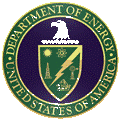United States Department of Energy

United States Department of Energy: Publications
Date of this Version
3-24-2010
Citation
United States Army War College, Strategy Research Project, March 24, 2010
Colonel Brett D. Weigle, Project Adviser
Abstract
The United States must balance securing our energy future with protecting our environment from climate change. A holistic approach is required to solve this complex problem. We must reduce demand for petroleum, improve energy efficiency, and develop feasible alternative energy solutions to include emission capture technologies.
The United States remains the largest consumer of energy products in the world and is the second leading producer of green house gas (GHG) emissions. Our dependence on imported petroleum is undermining our control of our national security interests. Petroleum comprises 63% of the United States’ energy consumption, with the transportation sector accounting for 68% of the oil consumed. Energy flexibility or diversity, rather than energy independence, is the key to improving our national energy security.
Included in
Energy Policy Commons, Natural Resources Management and Policy Commons, Oil, Gas, and Energy Commons, Sustainability Commons


Comments
United States government work. Public domain material.
This SRP is submitted in partial fulfillment of the requirements of the Master of Strategic Studies Degree.
The views expressed in this student academic research paper are those of the author and do not reflect the official policy or position of the Department of the Army, Department of Defense, or the U.S. Government.